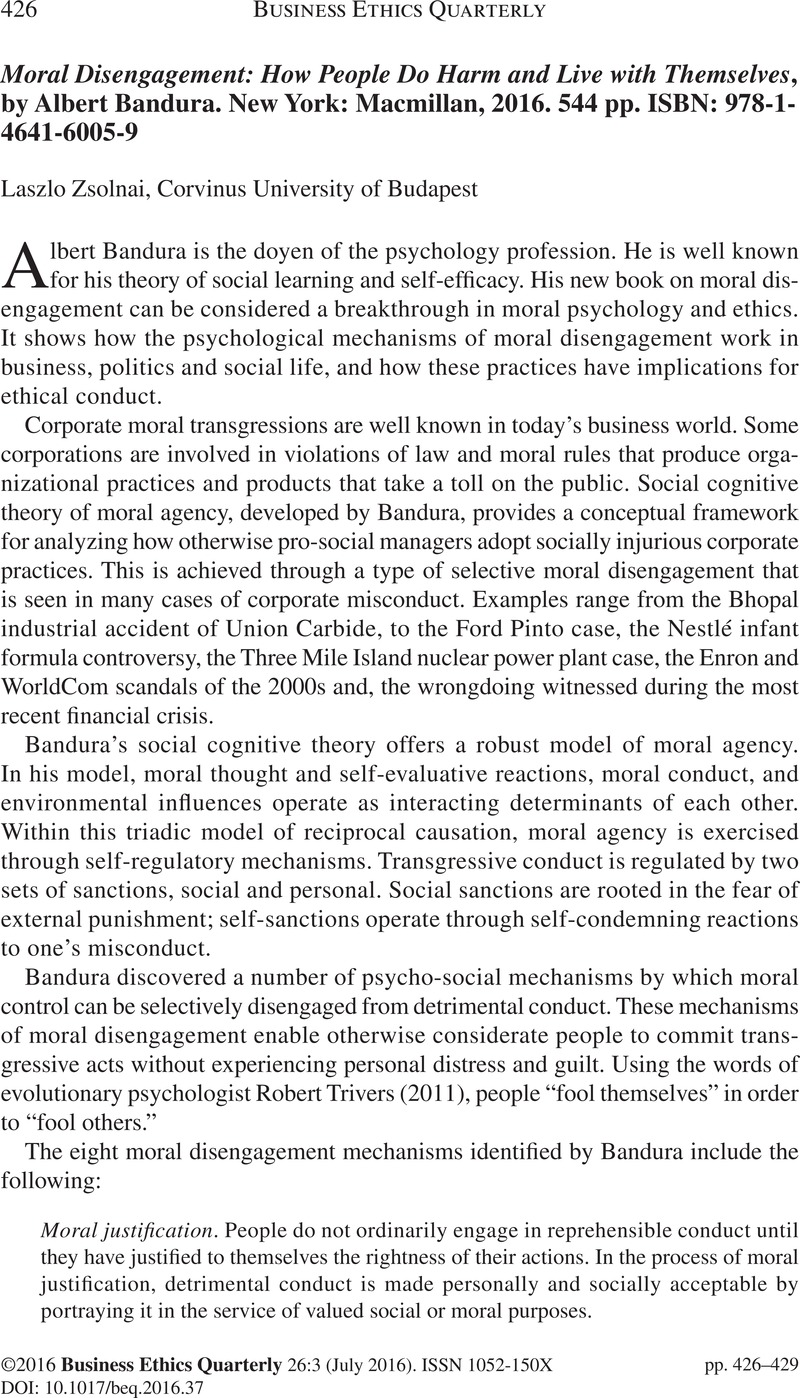Crossref Citations
This article has been cited by the following publications. This list is generated based on data provided by Crossref.
Messina, Martina
Di Sarno, Alfonso Davide
Mirko Alfano, Yari
Guastaferro, Maria
Nugnes, Nadia
Iennaco, Daniela
Maldonado, Nelson Mauro
Sperandeo, Raffaele
and
Nascivera, Nicole
2018.
Aggression or Aggressiveness? : A research hypothesis on aggression, videogames and executive functions in preschool age.
p.
000313.
Woolf, Linda M.
2019.
The Psychology of Peace Promotion.
p.
219.
Sharma, Nitasha
2020.
Dark tourism and moral disengagement in liminal spaces.
Tourism Geographies,
Vol. 22,
Issue. 2,
p.
273.
Dashkova, Sofia Vladimirovna
2020.
Cognitive Aspect of Individual Consciousness Manipulation by Terrorist Organizations.
Общество: социология, психология, педагогика,
Fanti, Kostas A.
and
Zacharaki, Georgia
2021.
The Wiley Blackwell Handbook of Bullying.
p.
502.
Condori Contrera, Ester
Rosario Quiroz, Fernando Joel
Ramos Fuentes, Daniel Ángel
Morí Holguín, Jesús Yolanda
Yaya Castañeda, Elena Esther
and
Villanueva-Batallanos, Marilyn
2022.
Análisis mediacional de la empatía en la relación entre la desconexión moral con la violencia ejecutada en el ámbito del noviazgo en jóvenes peruanos.
Salud, Ciencia y Tecnología - Serie de Conferencias,
Vol. 1,
Issue. ,
p.
264.
Samuel, Abneer E
and
Tsapayi, Enock Tinashe
2023.
Navigating Psychological Crises in Leadership Transitions.
Management Dynamics in the Knowledge Economy,
Vol. 11,
Issue. 3,
p.
286.
BAŞTAN, Ajda
and
DÜLEK, Ahmet
2023.
LEARNED VIOLENCE: BANDURA’S SOCIAL LEARNING THEORY IN EDWARD BOND'S THE CHILDREN.
Nevşehir Hacı Bektaş Veli Üniversitesi SBE Dergisi,
Vol. 13,
Issue. 1,
p.
106.
Adnan, Muhammad
Setiyono, Budi
Amaliyah, Anita
and
Turtiantoro, Turtiantoro
2023.
National Action Plan to Prevent and Combat Extremism (RAN-PE): Youth Perception and Trust in Public Policy.
WSEAS TRANSACTIONS ON ENVIRONMENT AND DEVELOPMENT,
Vol. 19,
Issue. ,
p.
174.
Boggio, Paulo Sérgio
Rêgo, Gabriel Gaudêncio
Everett, Jim A.C.
Vieira, Graziela Bonato
Graves, Rose
and
Sinnott-Armstrong, Walter
2023.
Who did it? Moral wrongness for us and them in the UK, US, and Brazil.
Philosophical Psychology,
p.
1.
Paciello, Marinella
Fida, Roberta
Skovgaard-Smith, Irene
Barbaranelli, Claudio
and
Caprara, Gian Vittorio
2023.
Withstanding Moral Disengagement: Moral Self-Efficacy as Moderator in Counterproductive Behavior Routinization.
Group & Organization Management,
Vol. 48,
Issue. 4,
p.
1096.
Burrell, Darrell Norman
Nobles, Calvin
Cusak, Austin
Jones, Laura Ann
Wright, Jorja B.
Mingo, Horace C.
Ferreras-Perez, Jennifer
Khanta, Katrina
Shen, Philip
and
Richardson, Kevin
2023.
Handbook of Research on Cybersecurity Risk in Contemporary Business Systems.
p.
121.
Antunez, Marlond
Ramalho, Nelson
and
Marques, Tânia M. G.
2024.
Context Matters Less Than Leadership in Preventing Unethical Behaviour in International Business.
Journal of Business Ethics,
Vol. 192,
Issue. 2,
p.
307.
Zhao, Manlu
Qu, Shiyou
Tian, Guyang
Mi, Yaping
and
Yan, Rui
2024.
Research on the moral slippery slope risk of unethical pro-organizational behavior and its mechanism: a moderated mediation model.
Current Psychology,
Vol. 43,
Issue. 19,
p.
17131.





